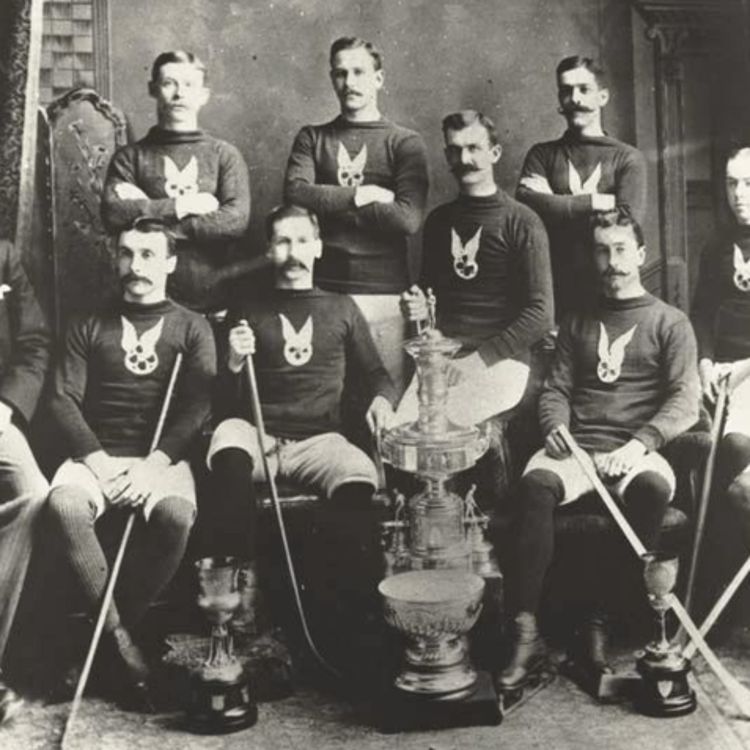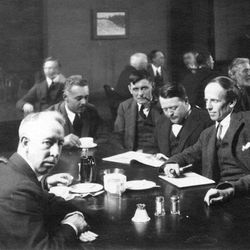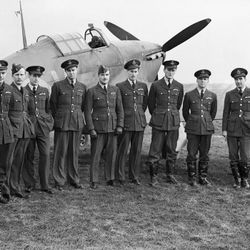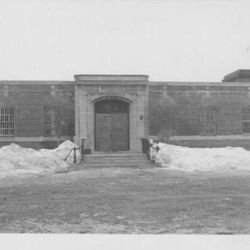Share

Curious Canadian History
S9E14 Hockey: The Game as We Know it Today
Hockey has had both an enduring but also a complicated relationship with ideas about what it means to be ‘Canadian’. While not every Canadian skates, or plays the game, or even cares about the game, the sport itself occupies a serous place in the Canadian cultural psyche. While the game has often been seen as something to unify Canadians, or to express ‘Canadianness’, it has also been exposed for very serious flaws in its culture, its infrastructure, and its dubious place as a game of character and inspiration for Canadian youth. The game of hockey, as we understand it now, has undergone dramatic challenges and changes since its first official appearance on ice in Montreal in the 1870s. This episode seeks to understand some of the key developments in the game that we now recognize today. From the rules to the rink size, to professionalization, commercialization, internationalization, to the broadening of the hockey cultural mosaic. From its amateur roots to a game that is international in its appeal, incorporating men and women from different socioeconomic classes and ethnic groups, and one that continues to evolve alongside modern value systems while evoking serious discussion on its relevance to modern Canadians.
Book recommendation: Canada’s Game: Hockey and Identity by Andrew C. Holman published McGill-Queen’s Press in 2009.
More episodes
View all episodes

S10E6 - The Group of 7
47:13|The Group of 7 are some of the most iconic and well-known Canadian painters in the history of Canadian art. While forming on the heels of the First World War, during a dramatic period of social and political upheaval, the painters in the group came to define a uniquely Canadian style of art. One that reflected a country that was searching for new ways to express itself after the incredible and traumatic contributions of the Great War. From the artistic pioneers to the adventurous men of the woods, the Group of 7 reflected and embraced the optimism and pioneering spirit of the day and, while certainly not perfect, went on to become some of the most important painters in this country's history. To help us talk bout the Group of 7 we have brought on John Geoghegan. John is a curator and writer based in Toronto. He joined the McMichael as Associate Curator Collections and Research in 2022 and has contributed to several McMichael projects on topics including the Group of Seven, historical Canadian women artists, contemporary Indigenous art, and many more . He holds an MA in art history from York University.In addition to their regular programming, which includes permanent collection exhibitions that include many works by members of the Group of Seven, the McMichael is currently showing Jackson's Wars: A.Y. Jackson Before the Group of Seven, an exhibition curated by Douglas Hunter, closing February 2nd, 2025. Check it out today!Don’t forget! You can pre-purchase a copy of Punching Above Our Weight: The Canadian Military at War Since 1867 right now at the below links:AmazonIndigoDundurnGoodreadsIndiebookstores.ca
S10E5 - Canadian Partisans in World War Two Yugoslavia
20:36|Across Axis occupied Europe a shadow war raged as numerous resistance groups in all occupied countries sought to dismantle or disrupt the Axis forces implementing their brutal occupation regimes. In some cases, these groups were quite successful, in others only marginally so, in all, though, the Allies ensured that they supported these movements to continue to strike against their daunting enemy. In the former Yugoslavia, agents of the Special Operations Executive were sent in to assess the quality of the resistance forces within that country and then to support those groups deemed worth of such support. What they found was a complicated and fraught situation and the SOE needed people familiar with both the language, culture and region to help sort it all out. Many of these to-be agents were drawn from Yugoslavians and those of Yugoslavian descent living in Canada. These agents would go on to eagerly expose themselves to intense danger, from Axis soldiers but also Yugoslavian groups sympathetic to the Axis powers. They fought Axis soldiers, they provided intelligence on Axis locations, and by the end of the war the ‘Partisans’ became one of the most effective resistance movements of the entire Second World War.Book recommendation Roy MacLaren’s Canadians Behind Enemy Lines, 1939-1945originally published in 1981 by UBC Press. Don’t forget! You can pre-purchase a copy of Punching Above Our Weight: The Canadian Military at War Since 1867 right now at the below links:AmazonIndigoDundurnGoodreadsIndiebookstores.ca
S10E4 - The Life and Times of Emily Carr
41:17|When one thinks of an iconic Canadian painter one does not have to go through many names before thinking of Emily Carr. And if one is looking for an influential west-coast painter than generally one’s first thoughts land on Emily. It is undeniable that Emily Carr has had a significant impact on the Canadian artistic landscape, as a woman, as a modernist, as an author, and as developing a particularly unique pacific northwest style. But Emily’s life, like so many painters, was full of immense challenges and even controversy. She spent most of her life in obscurity on Vancouver Island and it wasn’t until her final decades that the nation began to take notice. To discuss Emily’s life today we have invited on Pascale Halliday. Pascale is a historian and educator from Whitehorse, Yukon. Previously she worked as an interpreter at the MacBride Museum of Yukon History and as executive director for the Emily Carr House in Victoria, BC. The Emily Carr House is a beautifully restored provincial and national historic site in Victoria, BC, and was the birthplace of famed writer and artist, Emily Carr. Now the building and gardens are a vibrant cultural centre for education, exploration and mentoring. Drop in today as the House is launching a series of programs inspired by the themes of Emily Carr's life. Pascale is also the co-host of the Klondike Gold Rush History podcast, which can be found on most major streaming platformsIndian Reserve, North Vancouver, Emily Carr 11:05 Skeena, Beam Me Up!, Sonny Assu, 2015, 27:05 Crowsnest Mountain and the Seven Sisters, Joane Cardinal-Schubert, 1989, 27:10 Scorned as Timber, Beloved of the Sky, Emily Carr, 34:05Don’t forget! You can pre-purchase a copy of Punching Above Our Weight: The Canadian Military at War Since 1867 right now at the below links:AmazonIndigoDundurnGoodreadsIndiebookstores.ca
S10E3 CANCON and Canadian Music
27:44|All around the world today there are people who listen to music made by Canadians. Most of us are familiar with Drake and Justin Bieber but long before those two superstars, all over the world Canadian musical acts had been transmitting into the ears of humans. But in some alternate reality, none of the Bieber’s or Drake’s exist. In fact, there is probably an alternate reality somewhere where Canada is nothing more than a musical dumping ground for American acts. And if you want to know what that might look like, simply look at Canadian music before 1971. Prior to that year Canadian radio stations played whatever was charting in the US and whatever was being dictated by US labels. While some domestic music was played on local stations, the musical conversation was a south to north one, never an east-west one. But that all changed with CANCON – the introduction of Canadian content regulations. While CANCON was certainly controversial when it came out, it became the catalyst for the creation of a domestic music industry, one that would germinate, then grow, then expand, then cultivate some of the biggest acts, biggest producers and biggest musical icons the world has ever seen.Don’t forget! You can purchase a copy of Punching Above Our Weight: The Canadian Military at War Since 1867 right now at the below links:AmazonIndigoDundurnGoodreadsIndiebookstores.ca
**The New Book is Out**
02:36|Punching Above Our Weight: The Canadian Military at War Since 1867 is officially out! Check out this photograph-rich single volume history of Canada's military at war. You can purchase a copy right now at the below links:AmazonIndigoDundurnGoodreadsIndiebookstores.ca
S10E2 - Canadians in the Battle of Britain
43:26|For 113 terrifying days in 1940, Nazi Germany’s air force, the Luftwaffe, threw everything it had at Great Britain in hopes of early victory in World War II. The task of defending southern England from airborne attack fell to pilots in the Royal Air Force, supplemented in their darkest hour by more than 100 flyers from Canada. These Canadians, some from famous families, some straight off the farm, served in forty-seven different Battle of Britain squadrons. They fought bravely in the skies, risked their lives to defend Britain and participated in one of the most battles of the entire war. These Canadians were some of “the few” so many famously quoted by Winston Churchill. To talk to us today about this little known chapter in Canadian military history is author and historian Ted Barris. Ted Barris is an award-winning journalist, author, and broadcaster. His writing has regularly appeared in the national press, and magazines as diverse as Air Force, esprit de corps and Zoomer. He has also worked as host/contributor for most CBC Radio network programs, NPR in the U.S. and on TV Ontario. He taught journalism at Toronto’s Centennial College for 18 years. Ted is also the author of 22 books, many of them award winning publications. For instance, Ted’s 20th book, Battle of the Atlantic: Gauntlet to Victory was published in the fall of 2022 and immediately landed on the Globe and Mail and Toronto Star bestsellers lists. Following the book’s publication, Ted received word that he’d received Queen Elizabeth II’s Platinum Jubilee Award, recognizing “extraordinary contributions to our community and Canada.” On Dec. 29, 2022, Rideau Hall announced its latest Honours list. Ted Barris learned he will be appointed Member of the Order of Canada, “for advancing our understanding of Canadian military history as an acclaimed historical author, journalist and broadcaster.”This week’s book recommendation is Ted’s 22nd book titled Battle of Britain: Canadian Airmen in Their Finest House, published in 2024 by Sutherland House Books.
Special Episode 3 - Punching Above Our Weight - Pre-purchase available now!!
09:57|Our very own David Borys has a new book coming out in September titled “Punching Above Our Weight: The Canadian Military at War Since 1867” published by Dundurn Press. The book is an easy to read, single volume history of Canada at war since 1867. This photograph-rich volume covers nearly 150 years of the Canadian military, tracing its evolution from a small, underfunded, poorly trained militia to the modern, effective military it is today The book will be released on September 24th in Canada and October 22nd in the United States. As part of the pre-sale campaign CCH is dropping a series of short readings by David from sections of the book. For today’s story we go back to the late 19th century where heated debates rage throughout Canada regarding the nation’s role in the broader British empire. Some believe that Canada can continue to rely on Britain’s military assistance like it has always done, others are arguing for significant improvements to Canada’s current small and underfunded force, while others are adamant that Canada begin sending young Canadians to go overseas to fight for the empire as Britain becomes more and more embroiled in putting out imperial fires across its vast empire. You can pre-purchase a copy right now at the below links:AmazonIndigoDundurnGoodreadsIndiebookstores.ca
S10E1 - The Oak Ridge Experiment
22:01|Welcome back to Season 10!! In the first episode of the newest season we take you to Penetanguishene, Ontario along the shores of Georgian Bay where once existed the Oak Ridge ‘Criminal Insane Building.’ Oak Ridge has been deemed the ‘Alcatraz of Canada’ and ‘the most terrible institution of all.’ For decades it housed some of Canada’s most violent criminals and in particular violent criminals with serious psychiatric illnesses. Yet in the 1960s an intensive and radical therapy program arrived, promoting the widespread of drugs and treatment methods that frankly bordered on torture. The Social Therapy Unit at Oak Ridge is still remembered by some as a successful venture in utopian experimentation though for others it embodies a state-authorized subjection of the individual without any checks or balances. A place where patients became test subjects in a radical and controversial program of rehabilitation.This week’s book recommendation is Watching the Devil Dance by William Toffan, published in 2020 by Biblioasis.Don’t forget! You can pre-purchase a copy of Punching Above Our Weight: The Canadian Military at War Since 1867 right now at the below links:AmazonIndigoDundurnGoodreadsIndiebookstores.ca
Special Episode 2 - Punching Above Our Weight
07:19|**SPECIAL ANNOUNCEMENT – NEW BOOK** Our very own David Borys has a new book coming out in September titled “Punching Above Our Weight: The Canadian Military at War Since 1867” published by Dundurn Press. The book is an easy to read, single volume history of Canada at war since 1867. This photograph-rich volume covers nearly 150 years of the Canadian military, tracing its evolution from a small, underfunded, poorly trained militia to the modern, effective military it is today The book will be released on September 24th in Canada and October 22nd in the United States. As part of the pre-sale campaign CCH is dropping a series of short readings by David from sections of the book. Today’s excerpt takes us back to 1870/71 where the Canadian government has sent out a military expedition to secure the annexation of the Red River Colony. This expedition, known as the Wolseley Expedition, is not sure if they are going to encounter violence when they finally arrive in Red River after what was an arduous and challenging journey to what would become Canada’s newest province. You can pre-purchase a copy right now at the below links:AmazonIndigoDundurnGoodreadsIndiebookstores.ca